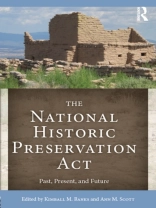Assessing fifty years of the National Historic Preservation Act (NHPA), passed in 1966, this volume examines the impact of this key piece of legislation on heritage practices in the United States. The editors and contributing authors summarize how we approached compliance in the past, how we approach it now, and how we may approach it in the future. This volume
- presents how federal, state, tribal entities, and contractors in different regions address compliance issues;
- examines half a century of changes in the level of inventory, evaluation and mitigation practices, and determinations of eligibility;
- describes how the federal and state agencies have changed their approach over half a century; the Act is examined from the Federal, SHPO, THPO, Advisory Council, and regional perspectives.
Using case studies authored by well-known heritage professionals based in universities, private practice, tribes, and government, this volume provides a critical and constructive examination of the NHPA and its future prospects. Archaeology students and scholars, as well heritage professionals, should find this book of interest.
Koop dit e-boek en ontvang er nog 1 GRATIS!
Formaat EPUB ● Pagina’s 306 ● ISBN 9781315520834 ● Editor Kimball M. Banks & Ann M. Scott ● Uitgeverij Taylor and Francis ● Gepubliceerd 2016 ● Downloadbare 3 keer ● Valuta EUR ● ID 5306965 ● Kopieerbeveiliging Adobe DRM
Vereist een DRM-compatibele e-boeklezer












